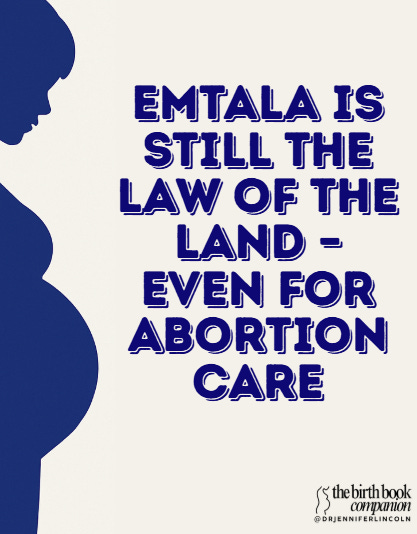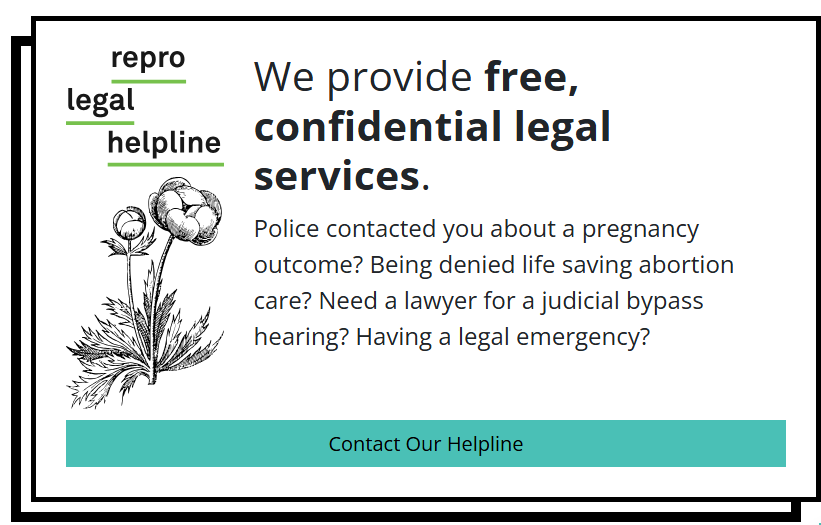EMTALA explained--correctly this time
...unlike most media headlines, and why this matters if you're pregnant
I’m sending this week’s newsletter out early as I want to correct some misinformation (and I’ve got lots of family plans next week that are going to be taking up my time!). You’ve probably been scrolling through the news and seeing "EMTALA" pop up everywhere, especially when it comes to pregnancy care, abortion, and politicians. And I’m going to be honest: how the media has covered this has made it only MORE confusing, IMO. Let me break it down for you in a way that is more understandable and without the false, clickbait headlines. I hope it helps.
-Dr. Jen
What is EMTALA? (and why should you care?)
Think of it as the "you can't turn away someone who needs emergent help" law.
The Emergency Medical Treatment and Labor Act – let's just call it EMTALA because life's too short for that mouthful – is a federal law (remember this part for later—it’s the point) from 1986 says that if you show up to an emergency room, they have to take care of you by examining you and providing stabilizing care in any emergency. Period. No matter if you have insurance or not.
What does this have to do with pregnancy?
Quite a few things! It means that at hospital Emergency Departments they must…
Check you out: If you show up to the ER with contractions or bleeding, they must give you a proper medical screening. They can’t refuse to see you just because your OBGYN works at a different hospital, or you don’t have insurance, or you’re not a U.S. citizen.
Fix what they can: If something's actually wrong, they need to stabilize you. If they can't handle your situation, they have to get you somewhere that can – safely and properly.
Not send you away in active labor: This is the big one for pregnancy! If you're in active labor, hospitals generally can't ship you off to another facility unless staying put would actually be more dangerous for you and baby.
Provide emergency abortion care: EMTALA covers situations where pregnancy complications threaten your health or life - like severe bleeding, dangerous infections, or ectopic pregnancies. This also includes emergency abortion care when necessary—regardless of what a state’s abortion laws might be. Unfortunately, we know in many ERs this isn’t happening thanks to unclear “exceptions” and fear of prosecution—but it’s still the law of the land and something you can (and should) demand. Keep reading to see how.
“But I thought Trump took away EMTALA for abortion?!”
I can see why you might think that—because if you’ve seen any posts on social media in the past week or so, you’ve likely seen those headlines everywhere. Here’s one from the Washington Post that makes me want to scream:

I am really frustrated with how the media covered this, and I think they’ve done far more harm than they realize in confusing pregnant Americans.
So let’s set it straight:
In 2022, the Biden administration clarified in a statement that hospitals must provide emergency abortions to stabilize patients, reminding them that EMTALA protections apply even in states with abortion bans. That’s the key: they were reminding them of what was already the law—they didn’t make a new one. This was crucial because after Roe fell, many patients weren’t getting emergency care; hospitals were telling doctors to wait or deny care, citing state abortion laws.
Then on June 3, 2025, the Trump administration said they were rescinding—aka withdrawing and ignoring—that reminder statement. Note that they did not end or alter EMTALA, but just the Biden-era statement.
This has led to a lot of confusion about what this means for EMTALA, pregnancy, and abortion—which most outlets, organizations, and social media creators have not reported on correctly. So let’s fix that.
Why did the Trump administration do this?
Probably to get brownie points with anti-abortion folks without actually doing something more obvious (like a national abortion ban which, would be highly unpopular). To be clear, this was written explicitly in Project 2025, the conservative mandate that Trump claims to know nothing about but yet has enacted 40% of it so far:
Does this mean they got rid of EMTALA?
No. Not even a little bit. EMTALA is a federal law, and it’s still the law of the land.
Does this mean hospitals no longer need to provide emergency abortions?
No, even though every news outlet seems to be reporting it that way, like the WaPo headline I shared above. But look—I fixed it!:
Isn’t this still bad?
Oh, for sure—but not for the reason the media says it is.
Anytime the government tries to make doctors scared to treat patients in an emergency means patients will be harmed by delayed or withheld care—but that was already happening before this statement-retraction went down. Josseli, Neveah, Amber, and Porsha are just a few women who tragically lost their lives in this way.
So what I’m trying to say is: Biden’s statement was a step in the right direction, but it didn’t fix the problem. It didn’t guarantee that emergency departments in Texas or Georgia would provide the lifesaving care they’re supposed to under federal law.
Here’s the real danger: the media framing this retraction as if Trump’s move wipes out EMTALA protections entirely is misleading. EMTALA still requires hospitals to provide stabilizing care, including emergency abortions when needed to save a pregnant person’s life.
When people believe that emergency abortions are completely off the table, they may not seek help at all.
And then what happens? More pregnant people will die.
“So what should I do?”
If you're facing a pregnancy emergency (even one where an abortion may be the treatment), you still have the right to evaluation and stabilizing treatment—which includes an abortion if necessary. No matter if it’s California or Texas.
You should:
Go to the Emergency Department if needed.
If an abortion is the treatment you are told you need, but they refuse or delay your care and cite state abortion bans as the reason, speak up and tell them EMTALA is still the law of the land.
Document everything. Written, video, social media—you name it. Pressure helps (yes, it’s ridiculous you need to think about this).
Reach out to the amazing legal team at the Repro Legal Helpline. These are lawyers who will help you FOR FREE.
Fight back by making sure you correct misinformation when you see it. Make sure your friends and family understand this is what’s going on right now. Tell your elected reps this is unacceptable.
TL;DR: While EMTALA itself hasn't changed, there may be more variation in how hospitals approach emergency pregnancy care. If you encounter any barriers to care, don't hesitate to advocate for yourself or ask for a patient advocate or get legal help—even though you shouldn’t need to have your life saved.
Let’s all stick together and keep working hard to get good, factual information out there in these confusing times. Found this useful? Please share and subscribe!
Until next time,
Dr. Jen









